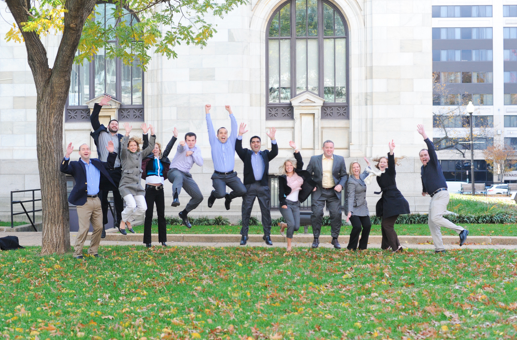 Ron Prater has worked in government consulting firms for almost 20 years, including three years with Arthur Andersen LLP. In 2007, he set out with partner Alan Pentz to create a company that would apply real entrepreneurial curiosity to find new ways to solve the U.S. government’s biggest problems. The result is Corner Alliance. Find out how this organization, triggered by a crisis in its formative years, applied the principle of collaboration to devise a new and different kind of corporate culture.
Ron Prater has worked in government consulting firms for almost 20 years, including three years with Arthur Andersen LLP. In 2007, he set out with partner Alan Pentz to create a company that would apply real entrepreneurial curiosity to find new ways to solve the U.S. government’s biggest problems. The result is Corner Alliance. Find out how this organization, triggered by a crisis in its formative years, applied the principle of collaboration to devise a new and different kind of corporate culture.
Leadership Lessons
Ron and I have known each other through other people for years. A few months ago I was talking with Corner Alliance Director Sarah Agan, a mutual colleague and veteran consultant. I was intrigued by the unusual ways she described a recent all-hands meeting. “We practice ‘inner voice’ all the time,” she said. “And we have an explicit value to eat our own dog food.” Needless to say, I was intrigued by Sarah’s word choice and even more so by her animation. I wanted to find out more. So I set up some time to talk with Ron and Sarah together.
Ron explained it to me, “‘Eating our own dog food’ means we operate the way we advise our clients to—we follow the same processes and approaches we recommend to them.” “Essentially, we practice what we preach. It can be harder than it sounds when you’re trying to balance helping clients succeed while also trying to grow a sustainable business. And it hasn’t always been that way, even in our company’s short life.”
Learning the Hard Way
Corner Alliance had some growing pains in its early years. “We had a really tough time a few years ago when we lost a project that led to a serious financial struggle,” Ron confided. “I, along with my partner, Alan, and our Director of Operations, Brandi Greygor, responded in typical ways. Privately, we talked daily about how much money we had left in the company’s line of credit and what to do if we maxed out what the bank would loan us. Publicly, we sent a general message to staff that we all needed to ‘increase billability’ but we were afraid to state the full reason.
“We thought we were doing the right thing by keeping the true stress from our staff. The MBA books say it’s important to protect the people from the stress of running the business. And the HR consultants told us we had to follow proper procedures to avoid lawsuits if we did have to lay people off. So we kept things hidden.”
Going contrary to conventional business wisdom, Ron and the other principals listened to their own inner wisdom. “It’s not how our guts said to handle it. We faced a real inner conflict every day for months. How do you form a company of trust and transparency when it seems like all the advice you get—from grad school, friends, lawyers, and more—says to withhold information?
“Looking back,” Ron said, “I grew more personally from that very tough time than from every great year I had. While it was hard, the learning from those six months led to one of the most positive and significant turning points for Corner Alliance.”
Eat Your Own Dog Food
Out of the crisis came a big transformation for the company. “With cost-cutting, along with full transparency with our staff, we managed to stabilize our operations,” Ron said, “And we realized that, on the heels of such a hard and painful time, we had a real opportunity to fundamentally re-think and re-vision.
“So Alan and I announced to our staff that he and I would map out a new company strategy,” Ron elaborated, “including our top three strategic priorities. We told people at an all-hands meeting that we’d start by focusing on which clients to talk to and what to offer them. That message landed with a thud. Within the first few minutes of the meeting it was clear we had made a huge mistake and needed to rethink the approach.
“Our people said, ‘That’s not how we advise our clients to develop strategy. So why are we doing it that way?’”
That uh-oh moment led to a dramatically different plan to create the company’s strategy. “We realized we’d be stronger if we engaged the whole company in the company,” Ron continued. “And instead of starting with what we do and where we want to go, we started with who we are and what we wanted to stand for as a company,” Ron explained.
 Put Values First
Put Values First
The group put first things first. “We focused first on our values, and to do that we created a conversation rather than creating a task,” Ron said. “We also found a way to make it a truly collaborative process, not just a collaborative process led by one person. We’ve never been about one-person trust—not at our core—so we found a way to define our values that would reflect that we all have to trust everyone else in the company.
“Since we’re a virtual company with staff in five different states, we selected an on-line tool to help us create the conversation. Everyone could contribute real-time, see each other’s inputs, make comments, and vote.”
Take Your Time
The process of defining yourself takes time Ron learned. “We allowed three weeks to generate ideas, and it took us about four months to solidify our values. If we had tried to get results in a one-day strategy session, our output would have been more generic—even with everyone participating,” Ron added. “People needed time to digest and think through what they stood for and then internalize that in relation to the company. The elapsed time allowed people to contribute at their best, and allowed the most important things to materialize organically.”
They ended up with 10 explicitly stated corporate values that are the foundation on which Corner Alliance continues to be built. Not surprisingly, “Eat our own dog food” was on the short list.
It’s a value that Sarah especially endorses. “We live that value even beyond our approach to strategy development,” she added. “Everyone takes turns running our internal meetings—everyone. We share leadership that way, and expand our capacity as leaders and facilitators at the same time. People get to experiment, practice, and learn in a safe environment, and they get real-time feedback. Just like the leaders we serve, we have to be willing to take risks and make mistakes to learn.”
Sarah continued, “It’s okay for things not to go well. What’s not okay is not learning from it. One of the greatest gifts we give each other is feedback. We are deliberate about creating a culture where we all recognize we’re both perfect and imperfect, where we can bring our whole selves—who we are and who we aren’t.”
Tell It Like It Is
Financial transparency is another key value that emerged from Corner Alliance’s collaborative strategy process. “Alan was instrumental in moving us to open-books management,” Ron said. “We now share just about everything with all employees every quarter, the exception being salary information. We have bi-weekly company-wide calls where everyone sees each other’s billability, our revenue, where we are exceeding or falling short of revenue projections. We don’t hide anything bad or anything good.”
Ron is clear that the effect is palpable. “It has made a massive difference in everyone understanding the business impact of their decisions,” he stated. “It also supports one of our other corporate values, which is sustainability. I believe the whole firm really understands the state of Corner Alliance and can see that we have a really strong foundation for growth right now.”
Be Bold with Clients
That kind of transparency also now extends to Corner Alliance clients—in a bold and differentiated way. The stated value “inner voice” is about people sharing their internal dialog as much as possible, recognizing that’s often where the truth lies. Corner Alliance staff is encouraged to not leave important things unsaid.
“This is definitely not easy,” Ron emphasized. “It takes a commitment to practice over time with our clients and with each other. We actually label it, as in, ‘Using my inner voice, I’d like to say I think there are serious organizational risks associated with what you are considering.’ This makes it easier to do and hear as the person listening now knows that the person speaking is taking a risk.
“Our people know they’ve got the organization behind them every time they venture into inner voice territory,” Ron affirmed. “As Alan points out about using inner voice, ‘It’s a personal risk to reveal what you’re thinking but not saying. It’s a risk to the organization if you don’t.’ But we all also recognize it’s important to apply this value wisely, appropriately, and thoughtfully.”
Perhaps the most unexpected result from this dedication to speaking the truth is that clients have begun to pick up both the practice and the lingo. Ron explained, “When our clients started saying to us, ‘My inner voice is saying xyz,’ we knew we were onto something bigger.”
Reap the Rewards
The list of indicators that Corner Alliance is onto something is long, and now includes growing staff, secure multi-year prime contracts in place, and work with key government executives who have budgets in the billions. “Corner Alliance is poised for an incredible year in 2012,” Ron said with pride. “Not only are we making a difference in the business of government, but we get emails from clients saying, ‘You’ve changed my life.’”
The focus for 2012? “Helping people thrive by doing creative, meaningful work, and living the life they want—not just the work life they want,” said Ron.
The Bottom Line
Ron feels very strongly that what Corner Alliance has created was not led by or done by one person. “Featuring me for this article is actually counter to our culture,” Ron stressed. “Corner Alliance has been led by a collaborative approach using values as our core, and that’s precisely what will lead us into the future.”
And a promising future it is.
Connect with Ron on LinkedIn.
——–
The Real People, Real Trust series offers an insider view into the challenges, successes, and make-it-or-break-it moments of people from all corners of the world who are leading with trust. Check out our prior posts: read about Chip Grizzard: A CEO You Should Know; Ralph Catillo: How One Account Executive Stands Apart; Anna Dutton: A Fresh Perspective on Sales Operations; Heber Sambucetti: A Learning Consultant’s Approach to Leadership; Janet Andrews: What Trust-based Strategy Consulting Looks, Feels, and Sounds Like, and John Dunn: An Entrepreneur Wins with Partnership.
 Oh man, did I do something stupid, embarrassing and untrustworthy today.
Oh man, did I do something stupid, embarrassing and untrustworthy today.
 Ron Prater
Ron Prater Put Values First
Put Values First In November 2000 we traveled with another couple to Turkey.
In November 2000 we traveled with another couple to Turkey.